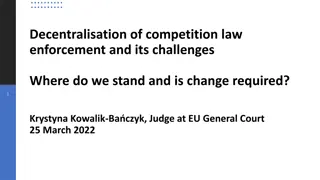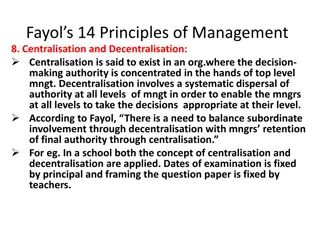African Union Charter on Decentralisation and Local Governance Summary
The African Union Charter on Decentralisation and Local Governance was adopted in June 2014 to provide a framework for decentralising powers within AU Member States. It aims to promote decentralisation, local governance, and local development by ratification through Parliament. Currently, 17 countri
1 views • 13 slides
Decentralisation Policy in Zambia: Enhancing Local Development Through Citizen Participation
The National Decentralisation Policy in Zambia, approved in 2002 and revised in 2016 and 2023, focuses on achieving sustainable development and improved service delivery through citizen engagement. Rooted in the belief that community involvement is crucial for socio-economic progress, the policy out
2 views • 12 slides
Enhancing Policy Harmonisation for Integrated Catchment Management (ICM) in Lesotho
Prioritizing policy harmonisation for ICM in Lesotho is crucial for sustainable water resource management. Key actions include revising the Water Act of 2008, aligning sectoral legislation, establishing clear links between land and water use, and supporting decentralisation efforts for operationalis
0 views • 10 slides
Challenges in Decentralisation of Competition Law Enforcement
Krystyna Kowalik-Ba.czyk discusses the challenges of decentralising competition law enforcement and the need for potential changes. The presentation highlights the current status, issues with decentralisation, the role of national competition authorities, and the importance of coherence and converge
0 views • 8 slides
Principles of Management According to Fayol
Fayol's 14 Principles of Management include concepts such as centralisation and decentralisation, scalar chain, and order. Centralisation concentrates decision-making authority at the top level, while decentralisation disperses it across management levels. Scalar chain emphasizes the formal lines of
0 views • 29 slides




